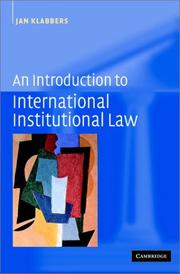| Listing 1 - 10 of 410 | << page >> |
Sort by
|
Periodical
ISSN: 14654628 Year: 1999 Publisher: London, U.K. : Europa Publications,
Abstract | Keywords | Export | Availability | Bookmark
 Loading...
Loading...Choose an application
- Reference Manager
- EndNote
- RefWorks (Direct export to RefWorks)
Multidisciplinary organizations --- Law --- International agencies --- -060.05 --- 337.05 --- Associations, International --- IGOs (Intergovernmental organizations) --- Institutions, International --- Intergovernmental organizations --- International administration --- International associations --- International governmental organizations --- International institutions --- International organizations --- International unions --- Organizations, International --- Specialized agencies of the United Nations --- International cooperation --- Interorganizational relations --- Non-state actors (International relations) --- International organization --- Periodicals --- Organisations internationales --- Directories. --- Répertoires
Book
ISBN: 9250014198 Year: 1983 Volume: vol 27/rev. 3
Abstract | Keywords | Export | Availability | Bookmark
 Loading...
Loading...Choose an application
- Reference Manager
- EndNote
- RefWorks (Direct export to RefWorks)
International agencies --- -Associations, International --- IGOs (Intergovernmental organizations) --- Institutions, International --- Intergovernmental organizations --- International administration --- International associations --- International governmental organizations --- International institutions --- International organizations --- International unions --- Organizations, International --- Specialized agencies of the United Nations --- International cooperation --- Interorganizational relations --- Non-state actors (International relations) --- International organization --- Abbreviations --- -Abbreviations --- Organisations. Sigles. (Dictionnaire multilingue) --- Organisaties. Letterwoorden. (Woordenboek, Veeltalig) --- Inter-governmental organizations
Book

ISBN: 9789186565633 918656563X Year: 2012 Publisher: Stockholm International Institute for democracy and Electoral Assistance
Abstract | Keywords | Export | Availability | Bookmark
 Loading...
Loading...Choose an application
- Reference Manager
- EndNote
- RefWorks (Direct export to RefWorks)
822.2 Regionale organisaties --- Election monitoring --- International agencies --- Associations, International --- IGOs (Intergovernmental organizations) --- Institutions, International --- Intergovernmental organizations --- International administration --- International associations --- International governmental organizations --- International institutions --- International organizations --- International unions --- Organizations, International --- Specialized agencies of the United Nations --- International cooperation --- Interorganizational relations --- Non-state actors (International relations) --- International organization --- Election observation --- Monitoring, Election --- Poll watching --- Elections --- Inter-governmental organizations
Book
ISBN: 9780230573222 0230573223 1349601365 1349601349 Year: 2008 Publisher: Basingstoke Palgrave Macmillan
Abstract | Keywords | Export | Availability | Bookmark
 Loading...
Loading...Choose an application
- Reference Manager
- EndNote
- RefWorks (Direct export to RefWorks)
International agencies --- Organisations internationales --- Directories. --- Dictionaries --- Répertoires --- Dictionnaires anglais --- Répertoires --- Associations, International --- IGOs (Intergovernmental organizations) --- Institutions, International --- Intergovernmental organizations --- International administration --- International associations --- International governmental organizations --- International institutions --- International organizations --- International unions --- Organizations, International --- Specialized agencies of the United Nations --- International cooperation --- Interorganizational relations --- Non-state actors (International relations) --- International organization --- Inter-governmental organizations --- Dictionaries.

ISBN: 0521817749 0521520932 1107135060 9786610955886 0511351399 1139130420 0511078404 1139165054 1280955880 0511202717 0511076835 9780521817745 9780511078408 9780511351396 9781139165051 9780521520935 Year: 2002 Publisher: Cambridge Cambridge University press
Abstract | Keywords | Export | Availability | Bookmark
 Loading...
Loading...Choose an application
- Reference Manager
- EndNote
- RefWorks (Direct export to RefWorks)
International organizations are unusual creations: generated by and for their member states, at the same time they often have to compete with those very states that created them. This complicated relationship often leads to some uncertainty in the law relating to international organizations: the legal argument of an organization will often be counterpointed by an equally valid argument from a member state. Professor Jan Klabbers is mindful of this complex relationship in his comprehensive analysis of international institutional law. As well as describing the law as it applies to legal institutions in chapters that include dispute settlement, financing and treaty-making, Klabbers looks forward to a re-appraisal of the status of international organizations. This is a key textbook for advanced-level students of law and of international relations.
International agencies. --- International agencies --- Associations, International --- IGOs (Intergovernmental organizations) --- Institutions, International --- Intergovernmental organizations --- International administration --- International associations --- International governmental organizations --- International institutions --- International organizations --- International unions --- Organizations, International --- Specialized agencies of the United Nations --- International cooperation --- Interorganizational relations --- Non-state actors (International relations) --- International organization --- Inter-governmental organizations --- Law --- General and Others
Book
ISBN: 0810313243 9780810313248 Year: 1976 Volume: 1 Publisher: Detroit Gale
Abstract | Keywords | Export | Availability | Bookmark
 Loading...
Loading...Choose an application
- Reference Manager
- EndNote
- RefWorks (Direct export to RefWorks)
International agencies --- Bibliography --- -Associations, International --- IGOs (Intergovernmental organizations) --- Institutions, International --- Intergovernmental organizations --- International administration --- International associations --- International governmental organizations --- International institutions --- International organizations --- International unions --- Organizations, International --- Specialized agencies of the United Nations --- International cooperation --- Interorganizational relations --- Non-state actors (International relations) --- International organization --- -Bibliography --- Associations, International --- Inter-governmental organizations --- International agencies - Bibliography

ISBN: 9024737176 9789024737178 Year: 1989 Publisher: Dordrecht Nijhoff
Abstract | Keywords | Export | Availability | Bookmark
 Loading...
Loading...Choose an application
- Reference Manager
- EndNote
- RefWorks (Direct export to RefWorks)
International agencies. --- Negotiation. --- International agencies --- Negotiation --- Bargaining --- Dickering --- Haggling --- Higgling --- Negotiating --- Negotiations --- Discussion --- Psychology, Applied --- Associations, International --- IGOs (Intergovernmental organizations) --- Institutions, International --- Intergovernmental organizations --- International administration --- International associations --- International governmental organizations --- International institutions --- International organizations --- International unions --- Organizations, International --- Specialized agencies of the United Nations --- International cooperation --- Interorganizational relations --- Non-state actors (International relations) --- International organization --- Inter-governmental organizations

ISBN: 9041110240 9789041110244 Year: 1998 Publisher: The Hague Kluwer law international
Abstract | Keywords | Export | Availability | Bookmark
 Loading...
Loading...Choose an application
- Reference Manager
- EndNote
- RefWorks (Direct export to RefWorks)
International law --- International agencies --- Law of nations --- Nations, Law of --- Public international law --- Associations, International --- IGOs (Intergovernmental organizations) --- Institutions, International --- Intergovernmental organizations --- International administration --- International associations --- International governmental organizations --- International institutions --- International organizations --- International unions --- Organizations, International --- Specialized agencies of the United Nations --- Law --- International cooperation --- Interorganizational relations --- Non-state actors (International relations) --- International organization --- Inter-governmental organizations

ISBN: 9041115358 9004420843 9789041115355 9789004420847 Year: 2001 Volume: 37 Publisher: The Hague Kluwer law international
Abstract | Keywords | Export | Availability | Bookmark
 Loading...
Loading...Choose an application
- Reference Manager
- EndNote
- RefWorks (Direct export to RefWorks)
The proliferation of international organizations is presently a hot issue. New international organizations have been created over the last few years, such as the Organization for the Prohibition of Chemical Weapons and the World Trade Organization. At the same time a certain reluctance may be observed to create new organizations. Overlapping activities and conflicting competences occur frequently and the need for coordination is evident. The events in former Yugoslavia are an example. Both during the armed conflicts in Bosnia and Kosovo and afterwards in the era of reconstruction, the need to coordinate the work of organizations such as the UN, NATO, the EU, the World Bank, OSCE, and the Council of Europe was vital. Against this background a number of legal issues have become more important that have not yet been researched extensively, perhaps the only exception being the proliferation of international tribunals. Questions include the following: Why were new organizations created while others already existed in the same or a related field? What specific legal problems have arisen that are related to the coexistence of different organizations working (partly) in the same area? What mechanisms or instruments have been developed to coordinate the activities and to solve legal problems? These and other questions were discussed during a conference that took place from 18 to 20 November, 1999, in the Academy Building of Leiden University, The Netherlands. A large number of experts, both academics and practitioners, participated. The purpose of this book is to present the issues discussed during the Leiden conference to a larger audience. This book contains the adapted papers for the conference and several other contributions.
International agencies. --- 341.1 --- International agencies --- Associations, International --- IGOs (Intergovernmental organizations) --- Institutions, International --- Intergovernmental organizations --- International administration --- International associations --- International governmental organizations --- International institutions --- International organizations --- International unions --- Organizations, International --- Specialized agencies of the United Nations --- International cooperation --- Interorganizational relations --- Non-state actors (International relations) --- International organization --- Internationale organisaties --(algemeen) --- 341.1 Internationale organisaties --(algemeen) --- Inter-governmental organizations --- International agency
Book
ISBN: 9290927682 9789290927686 Year: 1999 Volume: 442 Publisher: Noordwijk ESA
Abstract | Keywords | Export | Availability | Bookmark
 Loading...
Loading...Choose an application
- Reference Manager
- EndNote
- RefWorks (Direct export to RefWorks)
Space law --- International agencies --- Aerospace law --- Astronautics --- Space flight --- International law --- Aeronautics --- Associations, International --- IGOs (Intergovernmental organizations) --- Institutions, International --- Intergovernmental organizations --- International administration --- International associations --- International governmental organizations --- International institutions --- International organizations --- International unions --- Organizations, International --- Specialized agencies of the United Nations --- International cooperation --- Interorganizational relations --- Non-state actors (International relations) --- International organization --- Law and legislation --- Space law - Congresses. --- International agencies - Congresses.
| Listing 1 - 10 of 410 | << page >> |
Sort by
|

 Search
Search Feedback
Feedback About
About Help
Help News
News